The online platform is targeted at Allied Health Professionals (AHPs), a term which covers 12 health professions including dietitians, art therapists, occupational therapists, paramedics, physiotherapists, speech therapists and radiographers.
The initiative is part of NHS England chief allied health professions officer Suzanne Rastrick’s attempt to “co-create a vision of how, with collective action, our nation will be different if all AHPs were used effectively in the health, social and wider care system”.
The mandate for change sits within the context of the NHS’ ‘Five Year Forward View’, which seeks to create new models of care in the UK.
Dr Joanne Fillingham, clinical fellow to Suzanne Rastrick, told us they were hoping to get over 1,000 AHPs registered for the two-week forum, which opened yesterday.
In 2013 there were 64,377 AHPs working for the NHS – that’s 6% of its workforce or an estimated £2bn of its salary bill.
The number of AHPs has increased by 34% in 11 years, according to independent watchdog QualityWatch.
“This is quite revolutionary – it hasn’t been done by us on this scale before. The rationale of crowdsourcing is that the crowd will have the answer.”
Fillingham said there was often a feeling from front-line professionals that commissioners rolled out strategies without understanding the day-to-day demands of the job and this initiative sought to re-balance this process.
A sea change
“I think it’s not about the methodology, it’s about a whole sea change in NHS leadership style. Historically it’s been top down, micromanagement style – and this has served us well to reduce waiting times for example.

“But it has also resulted in some catastrophes where the eye has been taken off the ball with patient care.”
Crowdsourcing – in this case supported by the UK company Clever Together – opens the decision making process up to a diverse range of views and captures the belief that “people come to work to do good”, she said.
“It’s a caring business – and if you care for your staff they will care for your patients.
“We’re not writing strategies in a darkened room – we’re saying: ‘We really believe you have the answers.’”
Nutrition an essential element
The initiative has been backed by the trade union British Dietetic Association (BDA), which has urged all of its 8,500 members to register to “ensure the voice of dietitians is heard loud and clear”.
“This is a unique chance for dietitians from every part of professional practice to have a say, share examples of best practice and shape the future of our profession,” BDA chief executive Andy Burman said in a statement.
Fillingham said it was “essential dietitians have a voice”, particularly given the current obesity crisis.
“They are absolutely essential to the public health prevention challenge we’ve got.”
The platform poses two key questions on how things could be done differently and asks registrants to share their experiences.
The results will be presented at the Chief Allied Health Professions Officers Conference in June, after which the platform will be reopened to invite wider stakeholders including patients, the general public, commissioners and the voluntary sector to comment on the findings.
The bigger picture
Crowdsourcing is something which has also been considered on an EU level.
At the end of last year the European Food Safety Authority (EFSA) published a tender for a scoping exercise on the use of crowdsourcing tools for risk assessments.
Discussing the concept, EFSA’s executive director Bernhard Url told us he thought crowdsourcing was “a fascinating new tool for science to broaden the evidence base” and tap into a “‘black sea’ of unknown expertise”.
"We would have access to thousands of scientists that usually don’t work with EFSA and for them it would be a question of two hours or maybe even 30 minutes to make a comment on that [risk assessment question].”
